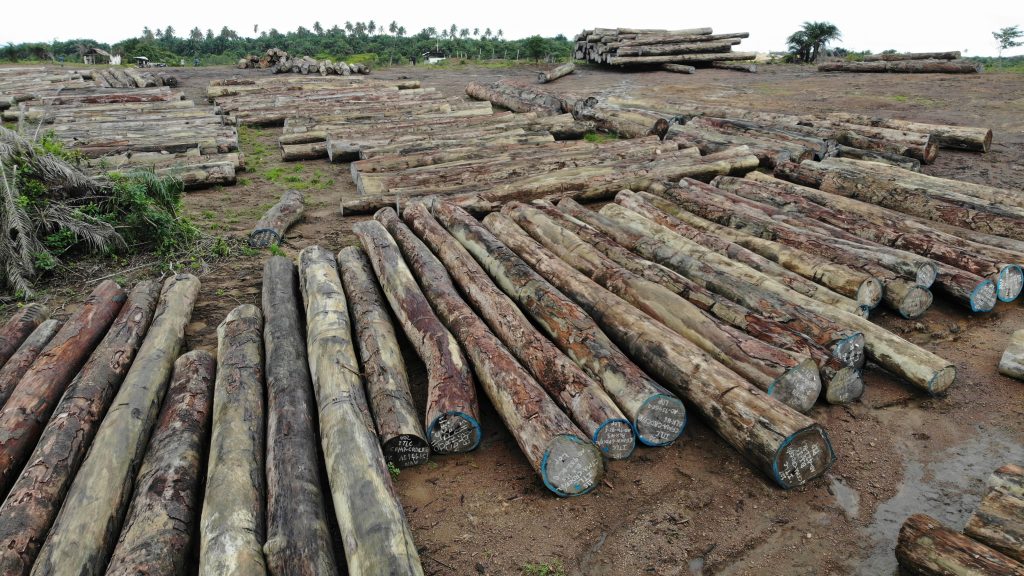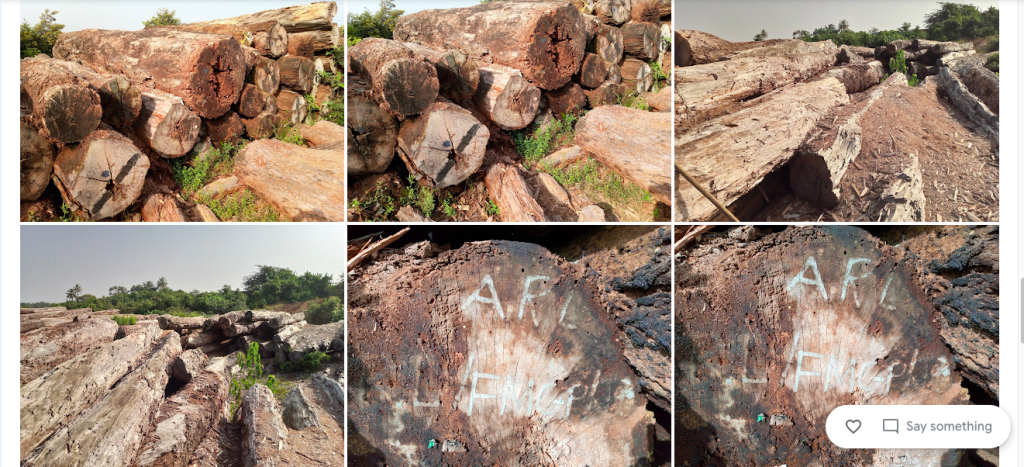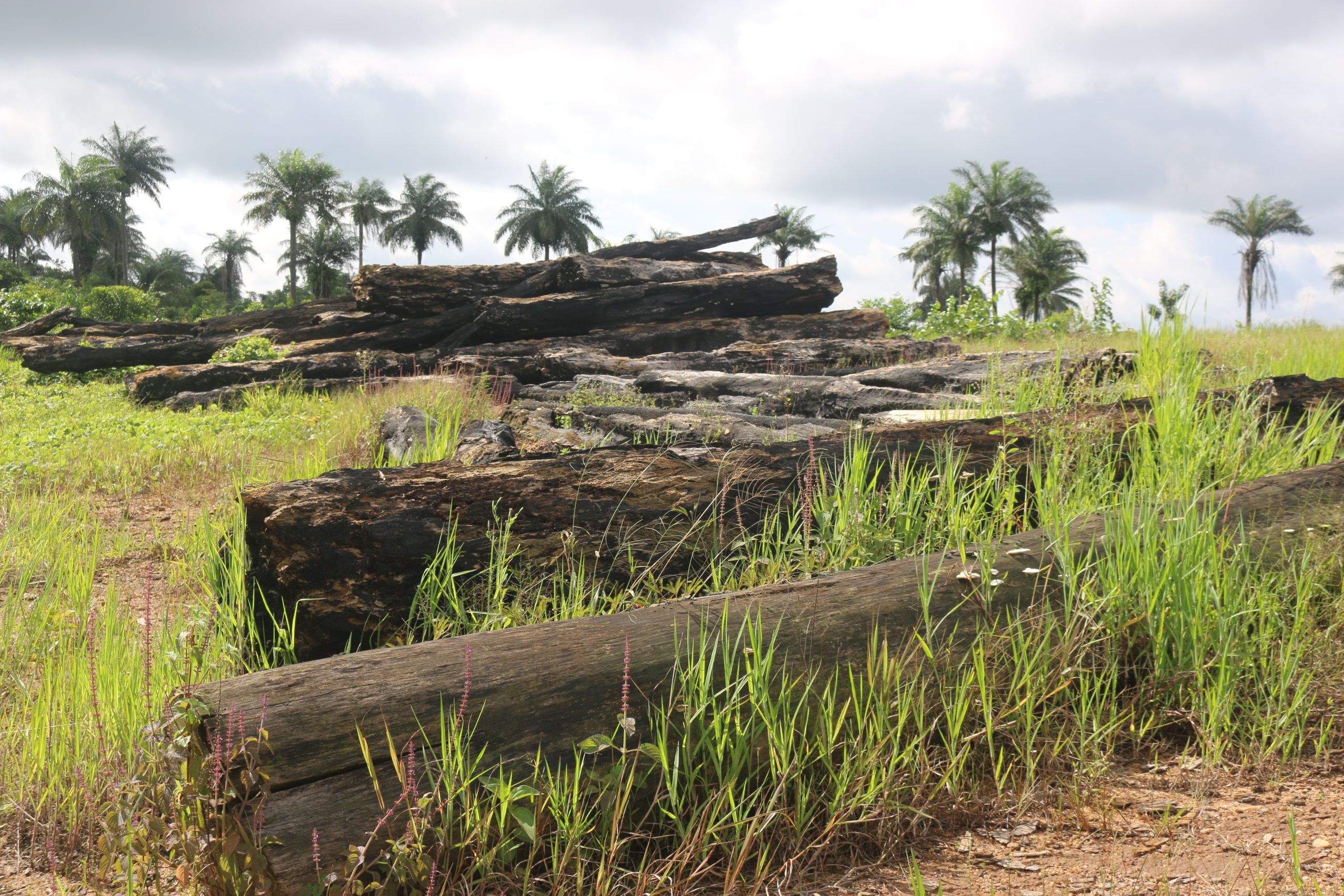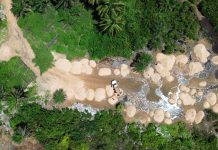Top: African Wood and Lumber Company abandoned hundreds of logs in Compound Number Two, Grand Bassa, with people burning some. The DayLight/James Harding Giahyue
By Emmanuel Sherman
MONROVIA – In the rainy season of 2020, the Forestry Development Authority (FDA) investigated the scale of abandoned logs in Grand Bassa, River Cess, and Nimba Counties.
Investigators were stunned by what they discovered: several companies had left thousands of logs in the bush, on open fields, at sawmills, and other locations for long periods.
“Valuable species are continuously being harvested by logging companies without first securing sales contracts,” the investigators said in a report, “only to leave those logs unattended.”
A signboard at a log yard used by Coveiyalah on the Bomi highway supported the investigator’s findings. It read: “Timber sale.” Investigators recommended that the FDA curtail the situation. The signboard came down not long after.
Four years after the report—spanning two administrations—the FDA has yet to take any concrete action despite officially vowing on various occasions, to tackle the problem. Abandoned logs are symbols of the meltdown of the forestry sector, with companies deserting contracts, leaving debts and logs in their wake.
Abu Musa Kamara, campaigner at the National Union of Community Forestry Development Committee, calls on the FDA to verify companies’ capacity before approving contracts. He urges constant monitoring and enforce forestry’s legal laws and regulations.

“If these things happen, there will be no abandoned logs in concession areas,” Kamara tells The DayLight in an email.
Logs are abandoned when left unattended at a location for a certain period. The Regulation on Abandoned Logs, Timber, and Timber Products imposes fines, a prison term, and contract termination.
The regulation replaced a previous one that had proven ineffective seven years ago and undermined the regulator’s mandate to avoid waste of forest resources. Under the current regulation, the FDA must investigate and petition a court to auction abandoned logs.
‘Learning curve’
In 2022, the FDA ordered all companies to declare their production in LiberTrace, Liberia’s log-tracking system. It was a bid to tackle the situation albeit two years after the investigators’ report.
Later that year, then-Managing Director Mike Doryen said in a DayLight interview the regulator would begin auctioning logs that month. “We… will continue in the northern region and then go down south and [the] western part,” Doryen said.
In the end, nothing happened, as more evidence emerged of companies leaving logs. The Italian-registered African Wood and Lumber left logs on a field in Grand Bassa, with some burned. The Lebanese-owned Masayaha abandoned some 600 nearby. At least 500 Sing Africa logs rotted outside of Buchanan alongside hundreds of logs other companies dashed. Elsewhere, a DayLight investigation uncovered about 5,000 logs abandoned by the International Consultant Capital in the Gbi-Doru District, Nimba County.
Doryen’s timeframe was legally impossible, and his comments were dishonest—or at least ignorant. Per the regulation, auctioning timber takes months. Moreover, there is no record that the FDA filed a required petition at any circuit court countrywide to seize abandoned logs.
Doryen would tell the Associated Press a year later that the FDA had approved exports of abandoned logs outside of the legal process as “part of the learning curve.”

In early 2023, the FDA announced it had suspended several companies’ harvesting certificates in Sinoe. The list included Malaysian-listed Mandra, which had abandoned about 7,000 logs, likely the largest The DayLight recorded.
“This decision is prompted by the failure of these companies to honor the mandate from the FDA to enrol all logs harvested in LiberTrace,” read an FDA statement. “Companies in both categories, suspended certificates and otherwise, may be subject to further [penalties]…”
Again, no public records that show the FDA punished the companies.
Unlawful
The FDA’s biggest-known abandoned logs lie occurred during last year’s presidential elections. On October 31, it published a notice on suspicion of abandoned logs on its website and ELBC.
A week later, the FDA petitioned the Zorzor, Magisterial Court in Lofa County to begin the process. “We hereby request Your Honor and this honorable court for a search and seizure warrant,” read the petition.

But that petition was unlawful and may have exposed the FDA’s dishonesty. The abandoned logs regulation requires the FDA to file a seizure application at a circuit court, not a magisterial court.
Also, the time interval between the announcement and the petition was short. Per the regulation, the petition should have been filed over a month after several notices.
Deputy Managing Director Gertrude Nyaley was one of two attorneys who signed the petition. She was the technical manager of the FDA’s legality verification department (LVD) then.
Nyaley posted pictures of the petitioning and a court document to her Facebook page in July this year. She was responding to a DayLight fact-check of false claims she had made on Okay FM’s Forest Hour regarding abandoned logs processes.
She did not respond to two questions in 19 days about her direct involvement in the unlawful process.

No progress
Things remain the same under Doryen’s successor Rudolph Merab. Like Doryen, Merab has not lived up to his commitment to confront the abandoned logs problem.
This April, two months after his induction as FDA’s boss, he happened upon mounts of sundried logs in the southeast. Merab vowed to tackle the problem head-on Spoon FM reported.
A July DayLight investigation—a follow-up to an initial one published over a year ago—found the Nigerian company Iroko Timber a Logging Company abandoned some 700 logs in Sinoe. FDA’s commercial department promised to investigate the company but did not.
The logs were recently exported, roughly two years since they were harvested, according to Bartee Togba, the chief officer of the Central River Dugbe Community Forest the company operates.
A recent review of forestry concessions by the US-based NGO Forest Trends recommends that the FDA documents the scale of abandoned logs and sets up a database. That, too, has not happened.

Merab did not return The DayLight’s queries and follow-ups, reversing a trend he had set. However, Merab told the Associated Press last April that he intended to scrap regulations that were “cumbersome” and “repressive.”
Amid the FDA’s dishonesty and failure, the Commercial Court authorized the sales of abandoned logs to pay off companies’ debts.
Perhaps the first publicized one is the case between Alma Wood and AfriLand Bank, which occurred before Merab. Co-owned by Lebanese businessman El Zein Hassan, Alma Wood defaulted on a US$63,000 loan from Afriland Bank. The court ordered the bank to auction Alma Wood’s properties, including 5,000 cubic meters of logs harvested in Grand Cape Mount County between 2018 and 2020.
Other cases involve Sing Africa, Alpha Logging and Wood Processing Company, and Guaranty Trust Bank (Liberia) Limited. Sing Africa borrowed US$ 3 million from GT Bank on June 14, 2021. When it failed to pay the loan, the court authorized the bank to auction the company’s assets valued over US$7 million, including logs it abandoned in Lofa and Gbarpolu.
The Court had earlier permitted the bank to auction 15,000 cubic meters of logs belonging to Sing Africa and Alpha.
Forestry experts say the banks’ auctions will reduce the government’s revenue and communities, benefits, and expose the system failure. Normally, auction fees should go to the government and the communities where the logs were felled. In this case, the banks take a big portion of the money.
“If the FDA had enforced the abandoned logs regulation, the banks would be left with only other fixed assets,” says an expert who does not want to be named.
Jonathan Yiah the lead forestry campaigner at the Sustainable Development Institute (SDI), an NGO instrumental in formulating forestry’s legal framework, agrees.
“The bank shouldn’t be a priority at the expense of the community and the government,” Yiah says, “though sometimes it is the government’s negligence that we are having this conversation.”
This story was a production of the Community of Forest and Environmental Journalists of Liberia (CoFEJ).





Facebook Comments